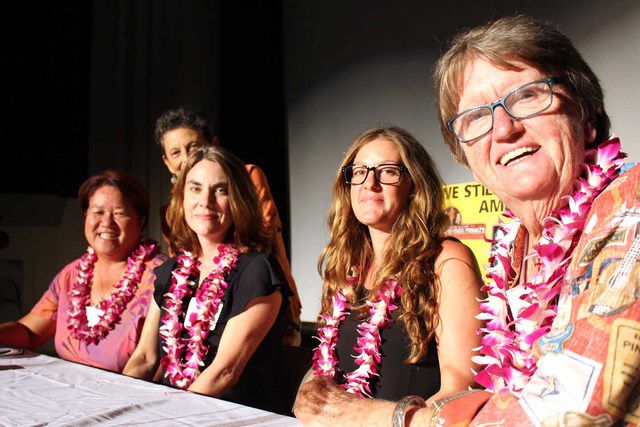The time is now for equal rights
As a female reporter who grew up in a family with four brothers, it’s hard to take an objective look at a film such as “Equal Means Equal.”
As a young woman, the need to constantly apologize for my existence was ingrained in me.
That’s my history, which is why I was elated when I learned that a documentary about women’s equality was coming to Kauai.
On Woman’s Equality Day, the YWCA of Kauai graciously hosted a free screening of a powerful documentary at the historic Waimea Theatre meant to elicit intense emotions in anyone — both men and women — who watched it.
In her movie, “Equal Means Equal,” documentary filmmaker Kamala Lopez takes an unapologetic look at the laws in the United States meant to protect women and then tells audiences the harsh reality: Women and men do not have equal rights under the Constitution.
For the past six years, Lopez said, she dug into gender discrimination by looking at domestic violence statistics, wage disparity and federal laws in the U.S. meant to ensure employers don’t take advantage of their female employees.
Laws such as the Equal Pay Act, Title X, Title VII, and the Pregnancy Discrimination Act, which is meant to protect women who are pregnant from being discriminated against by their employers simply for being pregnant.
The film also took an inside look at the Violence Against Women Act, a law meant to hold rapists accountable for their violent acts against women.
Together with journalists, actresses and lawmakers, Lopez explores these laws through the stories and lives of women first across the country, then takes her curiosity across the world only to learn that some of those women fair far greater hardships than many in the states.
And that’s what makes the absence of enforcement of these laws in our country so troubling.
While women in other countries don’t even have a civilized body of government attempting to protect them, the United States has created shells of laws that look on the outside like they are meant to protect women, but in reality hold no water.
When put to the test — the Supreme Court — these laws won’t hold up to a standard of review.
The film shocks us at times with clips of women being beaten by their partners, shot to death, raped on school campuses, or given harsher punishments than their male counterparts for committing crimes, which were committed in self-defense.
Through some investigative work, Lopez finds that sometimes police don’t respond to calls about domestic abuse; the Supreme Court said police don’t have to enforce temporary restraining orders; there are harsh penalties for battered women who kill men in self-defense and no protection for rape victims; and some incarcerated women or convicted felons don’t have access to rape kits.
On its face, maybe that doesn’t seem like gender discrimination. Put into context, it’s clear it is. Women are still disproportionately affected by child trafficking, prostitution, poverty, rape, domestic abuse or as being other victims of sex crimes.
But the film also moves us with stories about women who lost their entire lives after being told they should be ashamed of themselves for acts that were committed against them.
One woman tells a story so chilling about walking home after a rape, where she describes having her face scratched and bloodied and her pants torn.
She had to walk through a crowd of people on her way home. Not one of those people attempted to help her, she tells Lopez in the film, through tears.
While many conservative pundits dismiss the idea of the “war on women,” countless women in America live troublesome lives.
The takeaway?
We need more women in power, more women in Congress, more female reporters, more women CEOs, more women making decisions about women.
The film ends with a message from Lopez asking that we not rest until the Equal Rights Amendment, which was originally introduced in 1923, is ratified.
In the 1980s, when the equal rights movement reached its peak and had the backing of presidents and movie stars, it still failed to garner the 38 states it needed to be put it into the Constitution.
It was three states short. Since the ‘80s, the ERA has never again picked up steam.
The film, “Equal Means Equal,” is a way to get that momentum back, to reawaken that movement.
After the film Friday, YWCA Executive Director Renae Hamilton-Cambeilh hosted a 45-minute panel discussion to discuss how adding an equal rights amendment to the Constitution would affect the lives of women, socially and legally.
Panelists included Rep. Dee Morikawa (D-16), First Deputy Prosecuting Attorney Jennifer Winn, Title IX and Equal Rights Amendment Advocate Linda Estes and YWCA Prevention Educator Snow Carapetyan.
Each one of these women are strong, fierce and powerful.
The movie is so powerful, it evokes raw emotions in many people who watch it.
When Hamilton-Cambeilh asked the panelists their initial thoughts after having seen the movie, Estes said she wanted to go out and punch a man.
Although the audience may have laughed, the truth is, until we fight for equal rights for all, we won’t move forward.
But like Hamilton-Cambeilh said later, “Men are our greatest allies.”
In the first six months of 2016, Winn won two tough sex assault cases against child rapists on Kauai. One of those jury trials was against the son of Kauai’s fire chief.
Winn said that she hadn’t thought about a lot of topics raised by the film in a long time.
Women make up the majority of the victims in her sexual assault cases, she said.
“In my work, I’ve become numb to it,” Winn said. “The film reawakened these feelings in me and made me realize that I need to stop being numb.”
Carapetyan said the film made her want to cry.
In 2015, domestic abuse was so prevalent on Kauai, it came second only to criminal contempt of court. Hamilton-Cambeilh told me earlier this year that oftentimes on Kauai, domestic violence is fueled by substance abuse, another leader of arrests and prosecutions on our island.
Carapetyan said Friday that even though we see these high numbers of arrests, there are many more women out there who are suffering who do not report their abuse. According to the National Network to End Domestic Violence, three women die each day because of domestic violence.
Morikawa said until she researched information, she did not know about the ERA not being ratified.
All women agreed that it’s not OK to take away the basic freedoms of more than 50 percent of the human population. That’s the reality. Women make up about 51 percent of the human population.
Another showing of the film is planned for sometime in October.
The truth is women’s equality is not just beneficial to women, it’s beneficial for everyone.
Want to spread the word?
VARIOUS WAYS YOU CAN TAKE ACTION:
TAKE THE PLEDGE to only vote for elected representatives who support the Equal Rights Amendment.
SEND A LETTER to your elected representatives telling them that you support the immediate passage of the Equal Rights Amendment and educating them on why they should also support it.
HOST A HOUSE PARTY to screen “Equal Means Equal” with up to 25 of your friends and family at a private home starting on Sept. 6 when the movie becomes available On Demand. Sign up and get a kit to help you organize and take action.
SIGN THE CHANGE.ORG/ERA PETITION. Join Patricia Arquette, Kamala Lopez, Equal Rights Advocates and the ERA Coalition and demand full equality for women now.
JOIN THE MOVEMENT. Follow along on social media for more updates on “Equal Means Equal” and the latest ways to engage in the movement for equal rights.
DOWNLOAD THE EQUAL MEANS EQUAL LOGO and make it your social media avatar.
TAKE A SELFIE holding the EME logo or wearing the EME necklace. Tell us why you believe #equalmeansequal
SPREAD THE WORD by pledging to tell three people each day that women in America still don’t have equal rights under the law.




